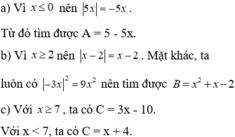Hãy nhập câu hỏi của bạn vào đây, nếu là tài khoản VIP, bạn sẽ được ưu tiên trả lời.

Bài 1:
a) Ta có: \(P=1+\dfrac{3}{x^2+5x+6}:\left(\dfrac{8x^2}{4x^3-8x^2}-\dfrac{3x}{3x^2-12}-\dfrac{1}{x+2}\right)\)
\(=1+\dfrac{3}{\left(x+2\right)\left(x+3\right)}:\left(\dfrac{8x^2}{4x^2\left(x-2\right)}-\dfrac{3x}{3\left(x-2\right)\left(x+2\right)}-\dfrac{1}{x+2}\right)\)
\(=1+\dfrac{3}{\left(x+2\right)\left(x+3\right)}:\left(\dfrac{4}{x-2}-\dfrac{x}{\left(x-2\right)\left(x+2\right)}-\dfrac{1}{x+2}\right)\)
\(=1+\dfrac{3}{\left(x+2\right)\left(x+3\right)}:\dfrac{4\left(x+2\right)-x-\left(x-2\right)}{\left(x-2\right)\left(x+2\right)}\)
\(=1+\dfrac{3}{\left(x+2\right)\left(x+3\right)}\cdot\dfrac{\left(x-2\right)\left(x+2\right)}{4x+8-x-x+2}\)
\(=1+3\cdot\dfrac{\left(x-2\right)}{\left(x+3\right)\left(2x+10\right)}\)
\(=1+\dfrac{3\left(x-2\right)}{\left(x+3\right)\left(2x+10\right)}\)
\(=\dfrac{\left(x+3\right)\left(2x+10\right)+3\left(x-2\right)}{\left(x+3\right)\left(2x+10\right)}\)
\(=\dfrac{2x^2+10x+6x+30+3x-6}{\left(x+3\right)\left(2x+10\right)}\)
\(=\dfrac{2x^2+19x-6}{\left(x+3\right)\left(2x+10\right)}\)

a) \(\left(x^5+4x^3-6x^2\right):4x^2\)
\(=\left(x^5:4x^2\right)+\left(4x^3:4x^2\right)+\left(-6x^2:4x^2\right)\)
\(=\dfrac{1}{4}x^3+x-\dfrac{3}{2}\)
b)
Vậy \(\left(x^3+x^2-12\right):\left(x-2\right)=x^2+3x+6\)
c) (-2x5 : 2x2) + (3x2 : 2x2) + (-4x^3 : 2x^2)
= \(-x^3+\dfrac{3}{2}-2x\)
d) \(\left(x^3-64\right):\left(x^2+4x+16\right)\)
\(=\left(x-4\right)\left(x^2+4x+16\right):\left(x^2+4x+16\right)\)
\(=x-4\)
(dùng hẳng đẳng thức thứ 7)
Bài 2 :
a) 3x(x - 2) - 5x(1 - x) - 8(x2 - 3)
= 3x2 - 6x - 5x + 5x2 - 8x2 + 24
= (3x2 + 5x2 - 8x2) + (-6x - 5x) + 24
= -11x + 24
b) (x - y)(x2 + xy + y2) + 2y3
= x3 - y3 + 2y3
= x3 + y3
c) (x - y)2 + (x + y)2 - 2(x - y)(x + y)
= (x - y)2 - 2(x - y)(x + y) + (x + y)2
= [(x - y) + x + y)2 = [x - y + x + y] = (2x)2 = 4x2
Bài 1 :
a]= \(\frac{1}{4}\)x3 + x - \(\frac{3}{2}\).
b] => [x3 + x2 -12 ] = [ x2 +3 ][x-2] + [-6]
c]= -x3 -2x +\(\frac{3}{2}\).
d] = [ x3 - 64 ] = [ x2 + 4x + 16][ x- 4].

Trả lời:
a, \(ĐK:x\ne\frac{1}{3}\)
\(A=\frac{3x+1-1}{1-3x}:\frac{3x-9x^2}{3x-1}=\frac{3x}{1-3x}\cdot\frac{3x-1}{3x-9x^2}=\frac{3x.\left(3x-1\right)}{\left(1-3x\right)\left(3x-9x^2\right)}=\frac{3x\left(3x-1\right)}{\left(1-3x\right)3x\left(1-3x\right)}\)
\(=\frac{3x\left(3x-1\right)}{3x\left(1-3x\right)^2}=\frac{3x\left(3x-1\right)}{3x\left(3x-1\right)^2}=\frac{1}{3x-1}\)
b, \(5x^2+3x=0\)
\(\Leftrightarrow x\left(5x+3\right)=0\)
\(\Leftrightarrow\orbr{\begin{cases}x=0\\5x+3=0\end{cases}\Leftrightarrow\orbr{\begin{cases}x=0\\x=-\frac{3}{5}\end{cases}}}\)
Thay x = 0 vào A, ta có :
\(A=\frac{1}{3.0-1}=\frac{1}{-1}=-1\)
Thay x = - 3/5 vào A, ta có :
\(A=\frac{1}{3.\left(-\frac{3}{5}\right)-1}=\frac{1}{-\frac{9}{5}-1}=\frac{1}{-\frac{14}{5}}=-\frac{5}{14}\)
c, \(A=\frac{x}{x-1}\)
\(\Leftrightarrow\frac{1}{3x-1}=\frac{x}{x-1}\)\(\left(ĐK:x\ne\frac{1}{3};x\ne1\right)\)
\(\Leftrightarrow\frac{x-1}{\left(3x-1\right)\left(x-1\right)}=\frac{x\left(3x-1\right)}{\left(3x-1\right)\left(x-1\right)}\)
\(\Rightarrow x-1=3x^2-x\)
\(\Leftrightarrow3x^2-x-x+1=0\)
\(\Leftrightarrow3x^2-2x+1=0\)
\(\Leftrightarrow3\left(x^2-\frac{2}{3}x+\frac{1}{3}\right)=0\)
\(\Leftrightarrow x^2-\frac{2}{3}x+\frac{1}{3}=0\)
\(\Leftrightarrow x^2-2.x.\frac{1}{3}+\frac{1}{9}+\frac{2}{9}=0\)
\(\Leftrightarrow\left(x-\frac{1}{3}\right)^2+\frac{2}{9}=0\)
\(\Leftrightarrow\left(x-\frac{1}{3}\right)^2=-\frac{2}{9}\) (vô lí)
Vậy không tìm được x thỏa mãn đề bài.
d, \(\frac{6}{A}=\frac{6}{\frac{1}{3x-1}}=6\left(3x-1\right)=18x-6\)
Vậy x thuộc Z thì 6/A thuộc Z

\(A=\left(3x+1-\frac{1}{1-3x}\right):\left(\frac{3x-9x^2}{3x-1}\right)=\left(\frac{1-9x^2-1}{1-3x}\right):\left(\frac{3x\left(1-3x\right)}{3x-1}\right)=-\frac{9x}{1-3x}:\left(-3x\right)=\frac{3}{1-3x}\)
b. Với \(5x^2+3x=0\Leftrightarrow x\left(5x+3\right)=0\Leftrightarrow\orbr{\begin{cases}x=0\\x=-\frac{3}{5}\end{cases}}\) nhưng mà ở trên ta cần có điều kiện x#0 nên
\(x=-\frac{3}{5}\Rightarrow A=\frac{3}{1-3\times\left(-\frac{3}{5}\right)}=\frac{15}{14}\)
c.\(A=\frac{x}{x-1}=\frac{3}{1-3x}\Leftrightarrow x-3x^2=3x-3\Leftrightarrow3x^2+2x-3=0\Leftrightarrow x=\frac{-1\pm\sqrt{10}}{3}\)
d.\(\frac{6}{A}=2\times\left(1-3x\right)\) nguyên nên \(1-3x=-\frac{k}{2}\Leftrightarrow x=\frac{k+2}{6}\) với k là số nguyên

Bài 2:
a: \(P=\dfrac{x+3}{x^2+5x+6}:\left(\dfrac{8x^2}{4x^3-8x^2}-\dfrac{3x}{3x^2-12}-\dfrac{1}{x+2}\right)\)
\(=\dfrac{1}{x+2}:\left(\dfrac{8x^2}{4x^2\left(x-2\right)}-\dfrac{3x}{3\left(x-2\right)\left(x+2\right)}-\dfrac{1}{x+2}\right)\)
\(=\dfrac{1}{x+2}:\left(\dfrac{4}{x-2}-\dfrac{1}{x+2}-\dfrac{x}{\left(x-2\right)\left(x+2\right)}\right)\)
\(=\dfrac{1}{x+2}:\dfrac{4x+6-x+2-x}{\left(x-2\right)\left(x+2\right)}\)
\(=\dfrac{1}{x+2}\cdot\dfrac{\left(x-2\right)\left(x+2\right)}{2x+8}=\dfrac{x-2}{2x+8}\)
b: Để P=0 thì x-2=0
hay x=2(loại)
Để P=1 thì 2x+8=x-2
hay x=-10(nhận)
Để P>0 thì \(\dfrac{x-2}{2x+8}>0\)
=>x>2 hoặc x<-4
